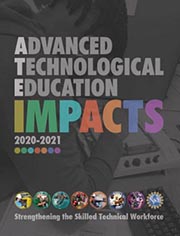
Mentor-Connect
mentor-connect.org
A team of experienced ATE Principal Investigators (PIs), working in collaboration with ATE center and project PIs and the American Association of Community Colleges, is running a regenerative mentoring system for leadership development and knowledge transfer to broaden the impact of the ATE Program. Targeted outreach is facilitating participation of technician educators from underserved groups and from community colleges that have either not been successful or have never received funding from the NSF. Peer mentoring is facilitating knowledge transfer and helping prepare the next generation of community college faculty leaders in advanced technological education fields critical to economic development and national security. This project builds on three successful pilot projects that engaged new institutions in the work of the ATE Program and improved outcomes for ATE projects and ATE Centers. Mentor-Connect has involved ATE PIs, NSF Program Officers, current grantees, potential grantees, the National Academy of Engineering, and the IBM Corporation in project planning. The project is delivering: * A system benchmarked to the IBM Global Mentoring Program with multiple innovative mentoring strategies and effective use of technology; * An increase in engagement with and competitive proposals from colleges and populations underrepresented in the NSF/ATE Program; * Online referral, resources and support services for use by mentors, prospective and current PIs, and NSF Program Officers; * A cadre of new, diverse Principal Investigators with leadership skills; * Broader utilization of existing ATE resources and; * Engagement of successful ATE PIs as mentors who give back to the ATE Program.







